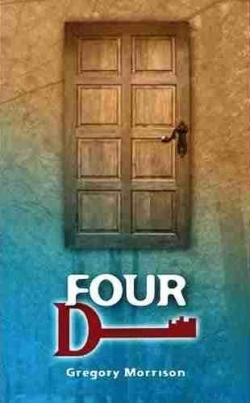Four D
In his ancient proverb, Chinese philosopher Zhuangzi questions the nature of reality and what constitutes a dream. This adage is often paraphrased in English: “Am I a man who dreamt of being a butterfly, or a butterfly dreaming I am a man?”
In other words, where do we draw the line between reality and fantasy? And is it even possible to distinguish between the two?
The characters in Gregory Morrison’s debut collection of four short stories, Four D, grapple with such questions while trying to make sense of their lives. The author is at his best when he delves into broad concepts: the comparison of reality to dreams, the horror of mental illness, and what motivates people to act the way they do.
Morrison sets up fascinating premises. For example, in “Space,” characters try to maintain friendship and love while people and objects around them vanish without warning. In “Four Rooms,” Elise confronts debilitating depression as she tries to escape the titular four rooms, only to discover that reality is not what she thought it was. These two set-ups—an all-knowing entity as Space that causes things to vanish, and a terrified young woman struggling to achieve mental clarity and flee her physical prison—draw readers in with their uniqueness and immediacy.
It’s easy to empathize with the characters’ changing emotions within Morrison’s spare prose. “Space” makes fascinating allusions to the Rapture foretold in the book of Revelation, yet Morrison’s mysterious, multi-faceted characterization of the thing known as Space leaves the exact nature of the entity open to interpretation. Similarly, Elise’s mind-boggling experience in the captivity of “Four Rooms” leaves it to readers to draw their own conclusions about mental illness and dreams.
Unfortunately, the other two stories, “The Principle of Luidgi” and “Guest,” are confusing and leave readers unsure of Morrison’s intent. And with the exception of Elise, all characters in the volume seem to be one-dimensional mouthpieces for the author’s ideas.
In “Space” and “Guest,” characters lack names, sometimes making it difficult to know to whom the narrator is referring. Much time elapses between scenes in all of the stories; sometimes readers are flung from scene to scene without awareness of how much time has passed. The dialog is often stilted and the characters’ actions unexpected, giving the impression that Morrison and his protagonists all know a secret that they refuse to tell the audience.
Its content being esoteric in nature, Four D is suited for those who thrive on challenge and those who prefer ideas to characterization.
Reviewed by
Jill Allen
Disclosure: This article is not an endorsement, but a review. The publisher of this book provided free copies of the book and paid a small fee to have their book reviewed by a professional reviewer. Foreword Reviews and Clarion Reviews make no guarantee that the publisher will receive a positive review. Foreword Magazine, Inc. is disclosing this in accordance with the Federal Trade Commission’s 16 CFR, Part 255.

